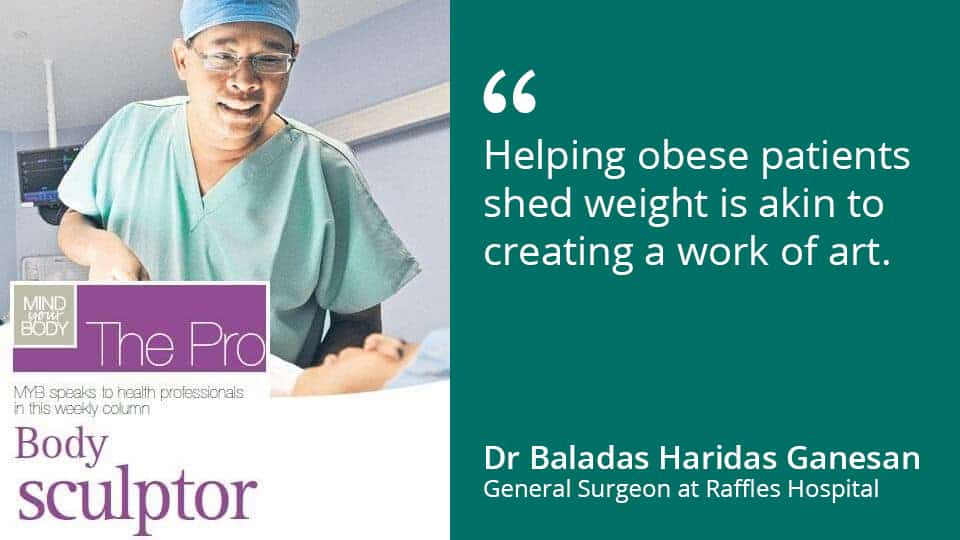Body sculptor

The Straits Times, Mind Your Body, 15 October 2009, By POON CHIAN HUI
Dr Baladas Haridas Ganesan, 45, a General Surgeon at Raffles Hospital who specialises in lap band surgery, says helping obese patients shed weight is akin to creating a work of art. POON CHIAN HUI reports
I decided to specialise in obesity surgery because…
After I graduated from medical school in 1988, I decided to sub-specialise in bariatric surgery (obesity surgery), together with stomach cancer and anti-reflux surgery.
At that time, many surgeons thought there was not much of a need for bariatric surgeons in Singapore as obesity was not a common problem. However, times have changed and bariatric surgery now makes up a significant part of my practice.
The human body is fascinating because…
Some obese people are that way because they overeat. However, there are others who are obese despite eating less than an average person. Their bodies simply send calories straight to the fat cells to be stored.
On the other hand, some people may eat a lot but still remain slim. This is because their bodies send most of the calories to the muscles, where they are burned to release energy. It all boils down to metabolism.
If I were to give an analogy for what I do, I would be a…
Sculptor as I view every operation as a work of art. Sculptors seek to produce permanent works of art. Similarly, I seek to help my patients get rid of the extra weight permanently through laparoscopic obesity or lap band surgery. This is a procedure where an adjustable gastric band is placed around the stomach to create a smaller stomach.
I have come across all types of cases…
Patients have come to me with all sorts of reasons for wanting lap band surgery; some were not even obese.
For those who were obese, their reasons ranged from wanting to look like celebrities to improving mobility and eliminating body odour. There were some who wanted to lose weight to save their marriages.
Whatever their reasons, they must meet the criteria as this is a medical and not cosmetic operation. For Asian patients, they must have a minimum body mass index (BMI) of 32.5 to qualify for the procedure.
A typical day for me would be…
I wake up at 7.30am and reach the hospital by 8.30am. I start the day by seeing ward patients and performing operations or procedures in the operating room before I spend the rest of the day in the clinic.
After knocking off at 5pm, I go home for dinner. I then unwind by watching TV with my 13-year-old daughter. If she has tuition, I might visit a bookstore or play a few rounds of golf at the driving range.
I love patients who are…
Realistic in their goals and expectations.
Patients who get my goat are…
Those who have serious misconceptions about my advice or treatment. For instance, they mistakenly believe that they will lose up to 20kg per month when it is usually about 4kg on average; that they can lose the weight without exercising; and that they can continue to eat high-calorie food.
One little known fact about gastric banding is…
It is the newest and safest of bariatric operations. This is because it involves only placing a band around the stomach. It does not involve cutting, removing or rejoining any part of the digestive tract. With a mortality risk of 0.1 per cent, it is about three times safer than gall-bladder surgery and five times safer than gastric stapling operations.
Things that put a smile on my face are…
The transformation of my patients after surgery. Patients typically lose up to 10kg in the first month and 2 to 3kg in subsequent months. Their health problems, such as diabetes and high blood pressure, gradually get better. They are also able to move around with greater ease.
The changes are so dramatic that if I were to see them a few years later, I would not even recognise them as my lap band patients.
It breaks my heart when…
People with morbid obesity – when BMI exceeds 32 or 37, depending on whether the patient has other medical conditions – are socially discriminated against by their friends and colleagues.
I would not trade places for the world because…
I am in a position to help people. Not only do I help patients look and feel better about themselves, I help to cure their medical problems as well as improve their quality of life. They are able to lead more active lifestyles, expand their social circles, save their marriages and, most importantly, live longer.
My best tip…
Do not wait till your BMI hits 50 before you seek a solution. If you are more than 20kg overweight and have failed to lose weight through diet and exercise, lap band surgery is an option. The surgery typically costs between $17,000 and $20,000 in total.



